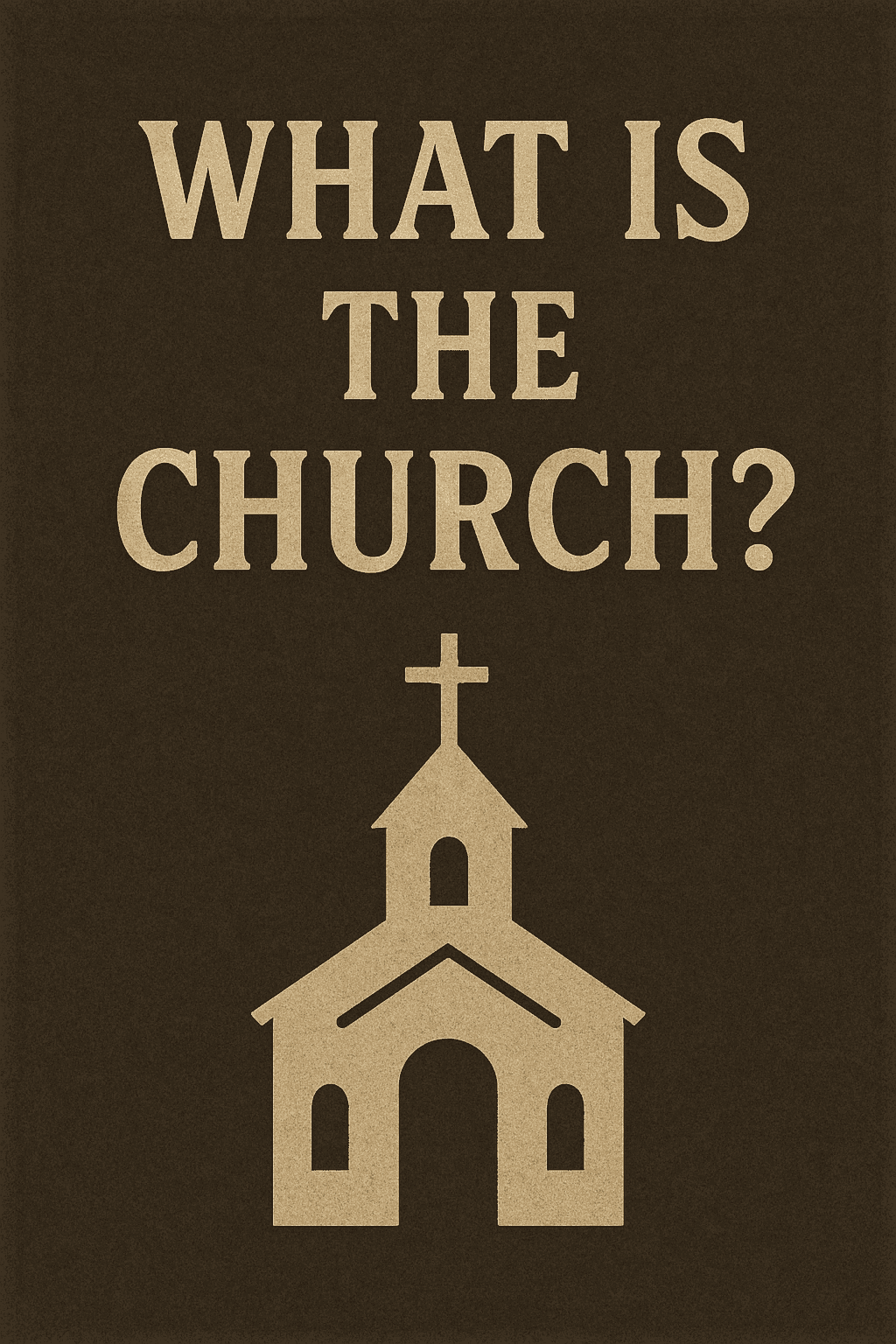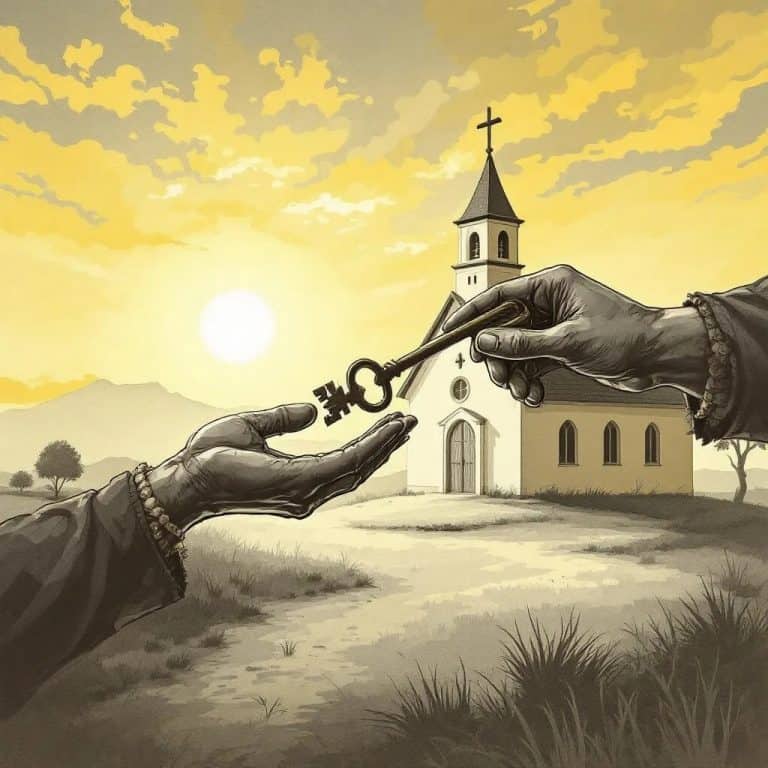What Is the Church? A Biblical Definition of Ekklesia and Its True Meaning
People talk about “the church” all the time. Some think of it as a building with a steeple, a place to gather on Sunday mornings. Others see it as an organization—a structure with leaders, traditions, and rules. Some say, “I don’t need church. I have my own faith. I can worship God anywhere.”

I get it. The word church has been thrown around so much that it’s easy to misunderstand what it actually means. Some have been burned by bad church experiences. Others have grown up thinking church is just a religious routine—something you do because your parents did. And then there are those who love their church but still struggle to explain what it really is.
If we really want to know the truth, we can’t rely on personal opinions or cultural definitions—we have to go to the Bible. So, what is the church? And what does God say about it?
The Meaning of “Church” in the Bible
When Jesus said, “I will build my church, and the gates of hell shall not prevail against it” (Matthew 16:18, ESV), He wasn’t talking about a physical structure. He wasn’t referring to denominations or weekly gatherings. He was talking about His people—the ones He would call out from the world and unite under His name.
The word church comes from the Greek ekklesia (ἐκκλησία), meaning “a called-out assembly” or “congregation.” In ancient Greek society, this word wasn’t even religious. It referred to a group of people summoned for a purpose, often to discuss civic matters. But in the New Testament, ekklesia took on an entirely new meaning—God’s people, called out from the world and gathered in Christ.
This wasn’t a new concept. In the Greek Old Testament (the Septuagint), the word ekklesia was used to translate the Hebrew word qahal (קהל), which referred to the assembly of Israel. Just as God called Israel out of Egypt to be His chosen people, He has now called His church out of the world to be His own.
From the beginning, the church was never about a place—it was about a people. The church doesn’t exist because someone decided to start a religious organization. It exists because God Himself called people to salvation through Jesus Christ. The church is God’s idea, not man’s invention.
What is the Church? The Church as the Body of Christ
If the church isn’t a building, then what is it? The Bible gives us several images to help us understand its nature.
Paul tells us in 1 Corinthians 12:27, “Now you are the body of Christ and individually members of it.” The church isn’t a loose collection of believers—it is a body, with Christ as its head. Just like a human body, every part has a role, and no member is unnecessary.
That challenges the way a lot of people think about church. Some see it as a personal, private thing—just “me and Jesus.” But God didn’t design Christianity to be lived in isolation. A Christian separated from the body of Christ is like a severed limb—it can’t function, and it certainly won’t survive.
What is the CHurch? The church is also described as the Bride of Christ. In Ephesians 5:25-27, Paul writes, “Husbands, love your wives, as Christ loved the church and gave himself up for her, that he might sanctify her, having cleansed her by the washing of water with the word.” This isn’t just sentimental language—this is covenant love. Christ laid down His life for His church, and one day, He will return to claim her fully.
And then there’s the image of a spiritual temple. Under the Old Covenant, God’s presence dwelled in the temple. But now, under the New Covenant, God dwells in His people. 1 Peter 2:5 says, “You yourselves like living stones are being built up as a spiritual house.” That means the church isn’t just a place we go—it’s something we are.
The Universal Church and the Local Church
Some people hear “church” and immediately think of a local congregation. Others think of Christianity as a whole. Which one is correct?
The Bible speaks of the church in two ways.

The universal church refers to all believers, across all time and places, who have been saved by faith in Jesus Christ. Ephesians 1:22-23 says, “And he put all things under his feet and gave him as head over all things to the church, which is his body.” Every true follower of Christ—past, present, and future—is part of this body.
But Scripture also talks about local churches—specific gatherings of believers in different places. 1 Corinthians 1:2 addresses “the church of God that is in Corinth,” showing that local churches were established for worship, teaching, and fellowship.
Yet, in modern times, many have drifted from the biblical idea of church. Some claim, “I don’t need to go to church to be a Christian.” It’s true—going to church doesn’t save you. But let’s be honest: a believer who isolates himself from the body isn’t following God’s design. Hebrews 10:25 tells us, “Do not neglect to meet together, as is the habit of some, but encourage one another.” Christianity isn’t a solo journey—it’s a family, and families gather.
The Role of the Church in God’s Plan
The church isn’t an optional add-on to the Christian life—it’s central to God’s mission. It was never meant to be a sideline ministry or a secondary tool for spreading the gospel. It is God’s primary instrument for carrying out His redemptive work in the world. Through the church, the gospel is preached, disciples are made, and believers are strengthened in their faith.
When Jesus gave the Great Commission, He entrusted this mission not to individuals alone, but to His gathered people—the church. In Matthew 28:19-20, He commands, “Go therefore and make disciples of all nations, baptizing them in the name of the Father and of the Son and of the Holy Spirit, teaching them to observe all that I have commanded you.” Notice that this wasn’t a vague suggestion to scattered believers—it was a direct command given to His disciples, the foundation of His church.
Some see the church as a human invention, something created by men to organize religious activity. But Scripture tells a different story. Galatians 3:7-9 shows us that God’s people have always been at the heart of His plan. His redemptive work didn’t start in the New Testament—it began all the way back with Abraham. God told him, “In you shall all the nations be blessed” (Galatians 3:8, quoting Genesis 12:3). That promise was ultimately fulfilled through Jesus Christ, and today, the church—made up of both Jews and Gentiles—carries forward that mission.
Under the Old Covenant, God worked through Israel, calling them to be a nation set apart, a light to the world. Under the New Covenant, He works through the church, a people redeemed by Christ, made up of every tribe, tongue, and nation. The church isn’t Plan B—it’s the fulfillment of God’s promise.
Paul makes this clear in Ephesians 3:10-11, where he writes, “So that through the church the manifold wisdom of God might now be made known to the rulers and authorities in the heavenly places. This was according to the eternal purpose that he has realized in Christ Jesus our Lord.” Did you catch that? The church wasn’t an afterthought. It was part of God’s eternal purpose—His plan from the very beginning.
The church is also the pillar and foundation of truth in the world. Paul writes in 1 Timothy 3:15, “If I delay, you may know how one ought to behave in the household of God, which is the church of the living God, a pillar and buttress of the truth.” The church is not just another organization; it is the dwelling place of God, the guardian of His truth, and the instrument through which He carries out His mission.
This is why being part of a local church is not just a good idea—it’s an essential part of following Christ. The church is where believers grow, where we encourage one another, and where we are equipped to carry the gospel forward. It is a family, a spiritual home, and a training ground for the kingdom work we have all been called to do.
If we truly belong to Christ, then we belong to His church. And if we belong to His church, then we are called to live out His mission together, proclaiming His gospel and making disciples in His name.
Why People Reject the Church
I’ve heard every reason people give for rejecting the church.

Some say, “The church is full of hypocrites.” And you know what? They’re right. But the church isn’t a country club for the righteous—it’s a hospital for sinners. Every member of the church is in a process of sanctification. If you’re looking for perfection, you’ll only find it in Christ.
Others argue, “I can worship God anywhere.” That’s true—you can. But if worship was just about personal experience, why did God command believers to gather? Corporate worship isn’t just about us—it’s about glorifying God together and building one another up in the faith.
Are You Part of Christ’s Church?
So, here’s the real question: Are you part of the church? Not just in name, not just because you attend services, but because you have been born again by faith in Jesus Christ.
The church is not a place you go—it’s a people you belong to. And the only way to be part of Christ’s church is to place your faith in Him. If you have done that, you are His body, His bride, His dwelling place.
But if you’re standing on the outside, looking in, now is the time. Christ calls His church to Himself. The door is open. Will you enter?
Final Thought
If you’ve never fully understood what it means to be part of Christ’s church, I encourage you to dig into the Scriptures. Find a local church that preaches the Word faithfully, and commit yourself to growing in the body of Christ.
If you have questions, reach out—I’d love to walk through this with you.
Would you like to know more about the biblical doctrine of election? Here’s my free pamphlet Chosen by Grace.
Blessings in Christ,
Wally
Walt Roderick is a Christian writer who cares more about biblical clarity than online applause. He writes to strengthen believers and confront spiritual drift.






